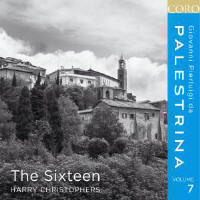Texte paru dans: / Appeared in: |
|
|
Outil de traduction ~ (Très approximatif) |
|
|
Reviewer: J.
F. Weber The seventh disc in an ongoing Palestrina series, the program here features a Mass once recorded by Wilfried Rombach (Fanfare 34:4) on a disc first issued a decade earlier than the review. Rombach’s group was only a bit larger than this one, so the most notable difference is tempo. While Rombach’s Credo is noticeably broader than this version, the other movements differ only slightly. Both versions are equally worthy. Published posthumously in 1599 and based on the chant antiphon, it is set for four voices (five in the Agnus Dei II). In contrast to the very early group of spiritual madrigals that fills out the other disc, recorded earlier by the Hilliard Ensemble, Christophers provides his usual variety of sacred works, including three more motets from the set of 29 taken from the Song of Songs. Because of the Marian focus of the Mass, there are a hymn for the Blessed Virgin and six other motets, not only for Mary but also for other women: for gospel figures named Mary, for the early Roman St. Barbara, and for the Old Testament Susanna, concluding with an antiphon for feasts of virgin saints. Martyn Imrie, writing the notes, is careful to distinguish the confusing list of gospel figures named Mary, for Mary Magdalen and Mary of Bethany (conflated in one of these motets) were regarded in the Western Church (but not the Eastern) as one person until 20th-century Scripture scholarship penetrated the precincts where decisions are made affecting the liturgical calendar. (Since 1970 texts used in the Mass and Office for St. Mary Magdalen are now limited to the correct gospel citations. Unfortunately, Mary of Bethany, who “chose the better part” in Our Lord’s words, now has no place in the liturgical calendar, though her nagging sister Martha still does.) The third person conflated in the old liturgy was the unnamed sinful woman who anointed the feet of Jesus; her story In diebus illis mulier was assigned to the feast of St. Mary Magdalen.
Christophers assembles a balanced group of works for the contents of each
disc in this Palestrina series, a task made easier by the wealth of music
found in his published complete works. Apart from the Song of Songs
(recorded complete several times), Ave maris stella, and Veni sponsa
Christi, the other five motets all seem to be first recordings. That makes
this disc all the more valuable, for Imrie acknowledges that the six-voice
Beata Barbara is less familiar than the five-voice Gaude Barbara, which has
been recorded. Ave maris stella, published with hymns for the liturgical
year in 1589, is sung alternatim with the familiar chant, while Veni sponsa
Christi was the basis for the composer’s Mass, first recorded together by
George Guest in 1967. If you have not heard this series of recordings, start
here. You will want to hear all of them, for they are exceptionally well
done. | |
|
Support us financially by purchasing this disc from eiher one of these suppliers. Un achat via l'un ou l'autre des fournisseurs proposés contribue à défrayer les coûts d'exploitation de ce site. |
|
|
|
|
|
Cliquez l'un ou l'autre
bouton pour découvrir bien d'autres critiques de CD |
|




